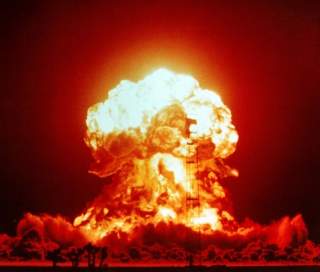Atomic Nightmare: Welcome to Pakistani Nuclear Weapons 101
Five things you need to know regarding one of the world's fastest-growing nuclear weapons programs.
5. The Bottom Line
Despite all of the attempts from the nuclear non-proliferation community, Pakistan will continue to develop and strengthen its nuclear deterrent as long as the high brass in the Pakistani military continues to have an India-centric mindset in its defense policy. India and Pakistan have fought three wars since Islamabad’s independence in 1947, and in each case, the Pakistanis were the either the losers are forced into a stalemate before acceding to a ceasefire (the 1971 breakaway of eastern Pakistan, which would later be named Bangladesh, was an especially embarrassing defeat for the Pakistanis). Islamabad hasn’t forgotten these cases ever since. And for the Pakistanis, the lessons of these past conflicts are all the same: we cannot repeat history.
India-Pakistan relations remain a sore spot for both nations, from the ongoing and never-ending Kashmir dispute to allegations of meddling in one another’s domestic affairs (India continues to strongly believe that the Inter-Services Intelligence directorate fosters a deep partnership with a number of anti-India terrorist groups, while Islamabad has levied accusations about India’s covert connections with the Pakistani Taliban). With so much bad blood between the two, it’s unfathomable to believe that Pakistan would voluntary cap the number of nuclear warheads or agree to put its entire nuclear program under IAEA supervision. President Obama recognized this dynamic early in his presidency, telling Joe Klein with Time magazine that the Kashmir conflict is a constant irritant to peace in South Asia and that a special U.S. envoy may need to be appointed in order to prod both sides to start negotiating a long-term solution in a serious way. Progress on that front, however, has been nonexistent: violence in Kashmir still flares up occasionally, and with every death, the Indo-Pakistani relationship suffers another blow.
In the current environment, we all better get used to Pakistan becoming the third-largest nuclear weapons state in the world.
Daniel R. DePetris is an analyst at Wikistrat, Inc., a geostrategic consulting firm, and a freelance researcher. He has also written for CNN.com, Small Wars Journal and The Diplomat.
Image: Wikimedia Commons/Antônio Milena

